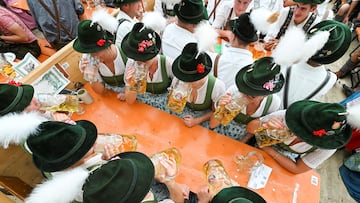CELEBRATIONS
Why does Oktoberfest begin in September? The world’s biggest beerfest kicks off in Munich
This curious calendar quirk has its roots in history and tradition, and it adds a unique twist to the month-long Bavarian celebration.

Oktoberfest, the world’s most famous beer festival, may sound like it should start in October, but in fact it traditionally kicks off in September. It is hosted every year in Munich in Bavaria, south Germany.
The festival’s origins date back to 12 October, 1810, when Bavaria’s Crown Prince Ludwig married Princess Therese of Saxony-Hildburghausen, a small state in central Germany. To commemorate this royal wedding, the citizens of Munich were invited to join in a grand celebration which included horse races, feasting, and of course, beer.
In the early years, Oktoberfest took place in October but over time it was shifted to September. The primary reason for this move was practical: Munich’s weather can be quite chilly in October, making outdoor festivities less enjoyable. By moving the festival to late September, organisers took advantage of the milder, sunnier days of early autumn.
While the name “Oktoberfest” no longer aligns with its historical timing, tradition and nostalgia have prevailed. Today, Oktoberfest runs for 16-18 days, depending on the year. The opening day is marked by a grand parade, the tapping of the first keg by the mayor of Munich, and the joyful cry of “O’zapft is!” (It’s tapped!).
How is Oktoberfest looking for 2023?
The 188th Oktoberfest began on 16 September and will run until 3 October at Theresienwiese, named after Princess Therese.
Aside from beer there is plenty of food on offer. You can savour classic Bavarian dishes such as pretzels, sausages (Bratwurst and Weisswurst), roast chicken (Hendl), sauerkraut, potato salad, and various regional specialties.
Many attendees, both locals and tourists, embrace the tradition of wearing traditional Bavarian clothing. Men wear lederhosen, while women don dirndls.






